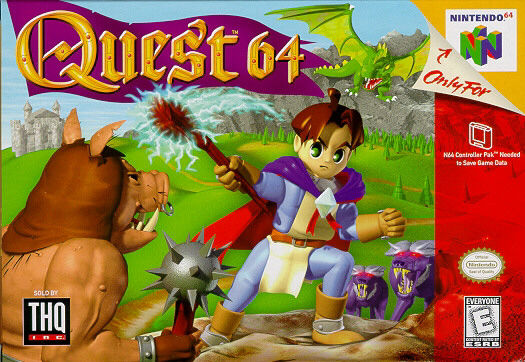
Released in North America on June 1st, 1998, Quest 64 was supposed to be the title that brought was supposed to bring upon a new era in Role Playing Games (RPG’s) for Nintendo’s new 64-bit console. Quest is the title that was intended to be the RPG that filled the void left by other major franchises once controlled by Nintendo such as Final Fantasy and Dragon Warrior. But after a string of mediocre to negative reviews, and with Zelda Ocarina of Time still months away, Quest 64 became a gaming pariah in the RPG genre.
The Plot
Developed by Imagineer studios and published by THQ, Quest 64 takes place in the fictional world of Celtland, which resembles a medieval British landscape. The titular character is known as Brian, a mage apprentice in service of the high priests at the local Monastery. One day Brian’s father sets off on a quest to track down a thief that stole a magical amulet from the high priests leaving Brian to follow in pursuit. This sets of a long-winded journey for the protagonist as he must travel from town to town acquiring information as to the whereabouts of his father and the stolen amulets which he will need to defeat the final boss. Brian must utilize four main elemental spells in order to progress through the game’s main campaign. These four magical elements are Wind, Fire, Earth, and Water.
Setting
Quest 64 features a medial style landscape that resembles 12th century Britain. For all its graphical achievements at the time, Quest 64 failed in providing any form of variation to its landscapes. Each town is as homogeneous to the next, with little difference to their structures or inhabitants. It is truly ironic considering Quest 64 touched upon every common RPG trope and still failed to live up to the most important element inherent to the genre. Environments and landscapes are what set the fantasy/RPG genre apart from all the rest. While providing a rich graphical design, Quest 64 gave players a cascade of simplicity when it came to Non-Playable Characters (NPCs) and setting. A major mishap that came back to haunt the much-touted Legend of Zelda killer its developers exclaimed upon its release.
Gameplay
While most other RPGs fall into the category of either real-time or strategy based battle sequences, Quest 64 implemented a more grid-based battle system that allowed the protagonist to move in any direction he chose as long as he stayed within the given space of movement. For instance, during an enemy encounter in the woods, Brian could be taking on a trio of wolves by himself. Rather than utilizing a tit for tat combat system, the above-mentioned title allows its protagonist to move in any direction within his given set of spherical movement, freely switching between the four allotted magical elements.
Quest 64 also does not have a monetary system that allows its protagonist to freely purchase items and upgrades through the story’s progression. Instead, Brian is given free treasure chests throughout the campaign. The main character can also acquire items that are dropped by fallen enemies during battle encounters that enable him to upgrade his magic attacks and apparel. This is a serious break from RPG tradition as many players know the arduous task it is to grind random fight encounters endlessly in order to level up or acquire in-game money. If your character dies he immediately is respawned in the nearest inn. All items he acquired before running out of Health Points Brian is allowed to keep. Every inn serves as a save point for the main character which at times could be a daunting way to save progress considering each town is separated by endless amounts of battle encounters and foot travel. The lack of a means to travel was a big misstep by THQ and given the fact that the game lacked a proper heads-up display (HUD) and compass, players can easily get confused during long stretches of travel.
Quest 64 does not feature a traditional character upgrade mechanic either. As is usual with most RPGs of that era, characters progress through a game’s story sequence by means of a level grinding that grants players experience points based upon the number of enemies you encounter. The more opponents you slay, the more points you acquire, and therefore the more skills your character develops. This traditionalist stance inherent to almost all RPG’s is completely subverted in Quest 64. Brian upgrades his skill set via the outcome of his battles and not by the number of enemies he kills. For example, if the main character deals a lot of damage during battle but takes in little, his attack skill set goes up while his defense levels remain the same. This was light years ahead of its time, as modern games such as The Elder Scrolls series owe much of its leveling up system to the much-maligned Nintendo 64 RPG. Quest 64 was unique in this way even if it did little else to offer the genre something new in terms of content and exposition.
Reception and Legacy
While Quest 64 has many negatives that hinder it from respectability, it still has many positives that have set the trend for many RPG’s to come. With its novel leveling mechanic, a free-roaming yet grid-based battle system, and a much-praised graphical style, all culminate to give Quest 64 a well-deserved second glance. While critics and gamers alike lambasted its turn of the mill fantasy setting that was as empty as the in-game dialogue, Quest 64 in hindsight is not as bad as most claim it to be. Quest 64 should be seen as a cautionary tale, a prime example for developers to not hold up new IPs to other more established franchises. Placing Brian on the same pedestal as Link gave THQ a lot of unnecessary pressure. After two decades since its initial release, Quest 64 should neither be praised nor maligned by retro enthusiasts and modern critics alike. As the Nintendo 64 fades away into console history, players can look fondly on THQ’s final product as the prime example of a game that could have done much more to expand upon the legacy set forth by other games that came before it. THQ did not have to compete with The Legend of Zelda but be something completely onto itself.
Quest 64 had many novel ideas for its time but simply putting something different in the mix of so much mundanity is a poor excuse for a console exclusive. Perhaps now is the time for this much-maligned RPG to receive a remastering or reimagining of sorts. But when a recipe fails from the outset, a top chef always discards the ingredients and begins again from scratch. This is something the developers of Quest 64 should have realized before unleashing this poor product onto the RPG starved Nintendo market. Brian’s Quest, the true sequel to Quest 64 never saw the light of day on consoles following its predecessor’s failure. A shamble of a port was released on the Gameboy Color a year later but still turned the intended series into a shamble.  This is truly a shame when all you have to do is realize that with a little bit of tweaking and time to work on its final product, THQ could have given Nintendo fanboys a true RPG experience.


Leave a Reply